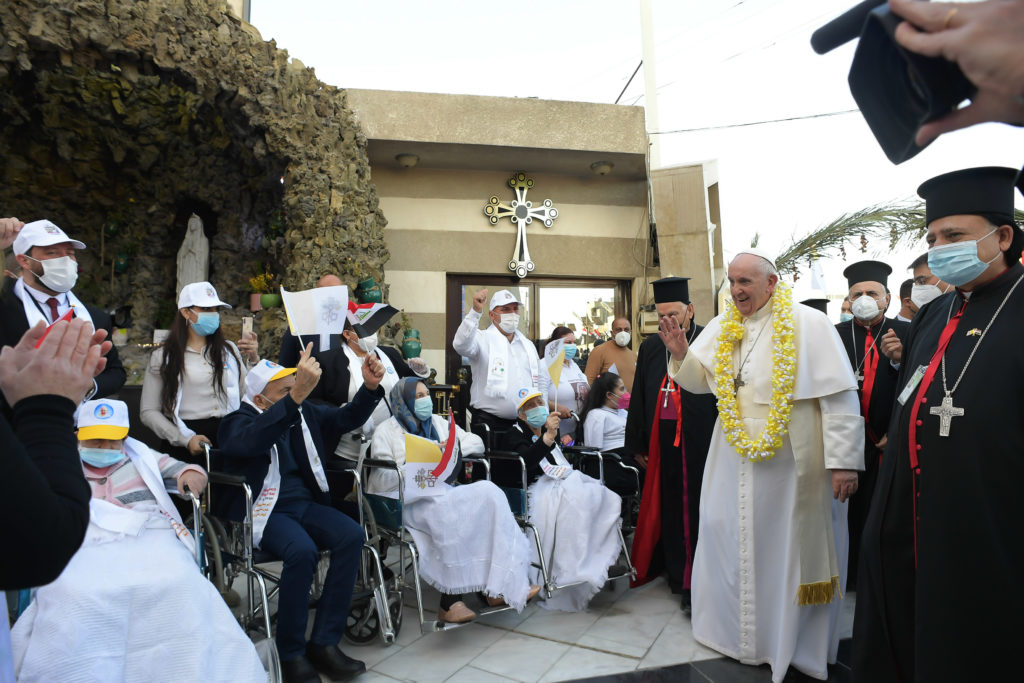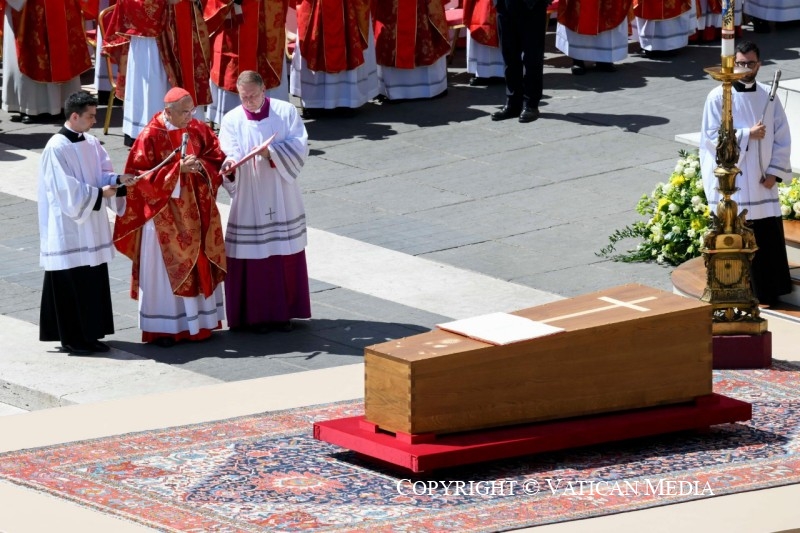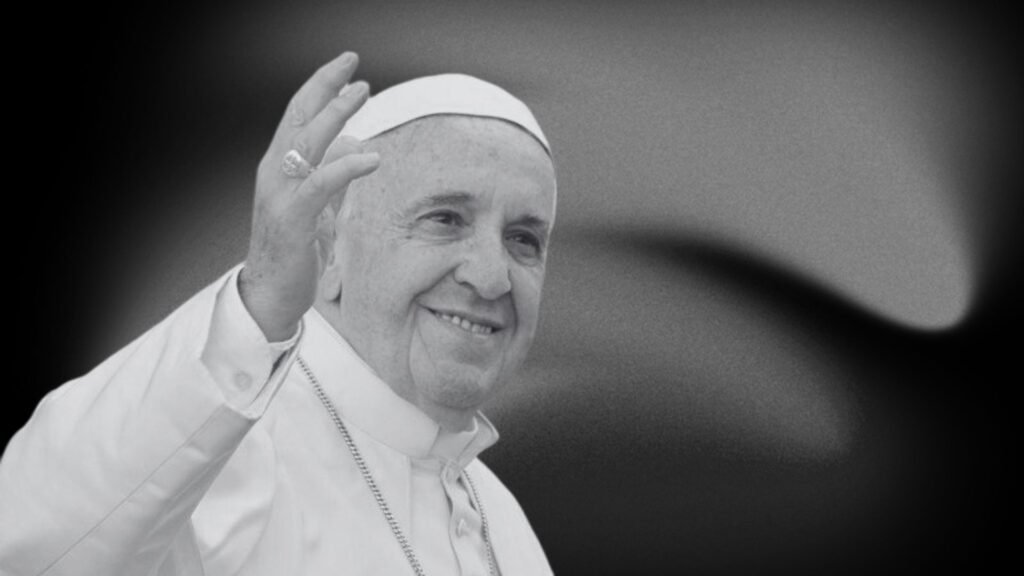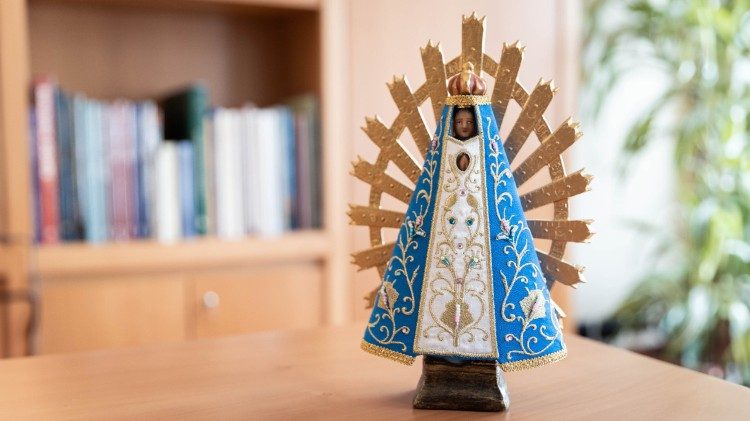In Baghdad, Pope Offers Iraqi Religious a Father’s Affection (Full Text)
‘All of you share in the joys and sufferings, the hopes and anxieties of Christ’s faithful’

Pope Francis embraced Iraqi religious with a “father’s affection” today in the Syro-Catholic Cathedral of “Our Lady of Salvation” in Baghdad.
The Holy Father addressed the bishops, priests, religious, consecrated person, seminarians, and catechists of the nation long beset with war, violence, and religious strife on the first day of his March 5-8 apostolic journey to Iraq.
“As bishops and priests, men and women religious, catechists and lay leaders, all of you share in the joys and sufferings, the hopes and anxieties of Christ’s faithful,” the Pope said. “ The needs of God’s people, and the daunting pastoral challenges that you daily face, have been aggravated in this time of pandemic. What must never be locked down or reduced, however, is our apostolic zeal, drawn in your case from ancient roots, from the unbroken presence of the Church in these lands since earliest times.”
The Pope recognized the horrible hardships the faithful have faced in Iraq in the past few years. And he thanked those present for remaining close to the faithful of the country.
“Let us never forget that Christ is proclaimed above all by the witness of lives transformed by the joy of the Gospel,” Pope Francis recalled. “The love of Christ summons us to set aside every kind of self-centredness or competition; it impels us to universal communion and challenges us to form a community of brothers and sisters who accept and care for one another”
Following is the full text of the Holy Father address, provided by the Vatican:
Your Beatitudes, Your Excellencies,
Dear Priests and Religious Sisters,
Dear Brothers and Sisters,
I embrace all of you with a father’s affection. I am grateful to the Lord who in his providence has made it possible for us to meet today. I thank His Beatitude Patriarch Ignace Youssif Younan and His Beatitude Cardinal Louis Sako for their words of welcome. We are gathered in this Cathedral of Our Lady of Salvation, hallowed by the blood of our brothers and sisters who here paid the ultimate price of their fidelity to the Lord and his Church. May the memory of their sacrifice inspire us to renew our own trust in the power of the cross and its saving message of forgiveness, reconciliation and rebirth. For Christians are called to bear witness to the love of Christ in every time and place. This is the Gospel that must be proclaimed and embodied in this beloved country as well.
As bishops and priests, men and women religious, catechists and lay leaders, all of you share in the joys and sufferings, the hopes and anxieties of Christ’s faithful. The needs of God’s people, and the daunting pastoral challenges that you daily face, have been aggravated in this time of pandemic. What must never be locked down or reduced, however, is our apostolic zeal, drawn in your case from ancient roots, from the unbroken presence of the Church in these lands since earliest times (cf. BENEDICT XVI, Post-Synodal Apostolic Exhortation Ecclesia in Medio Oriente, 5). We know how easy it is to be infected by the virus of discouragement that at times seems to spread all around us. Yet the Lord has given us an effective vaccine against that nasty virus. It is the hope born of persevering prayer and daily fidelity to our apostolates. With this vaccine, we can go forth with renewed strength, to share the joy of the Gospel as missionary disciples and living signs of the presence of God’s kingdom of holiness, justice, and peace.
How much the world around us needs to hear that message! Let us never forget that Christ is proclaimed above all by the witness of lives transformed by the joy of the Gospel. As we see from the earliest history of the Church in these lands, a living faith in Jesus is “contagious”; it can change the world. The example of the saints shows us that Christian discipleship is “not only something right and true but also something beautiful, capable of filling life with new splendor and profound joy, even in the midst of great difficulties” (Evangelii Gaudium, 167).
Hardships are part of the daily experience of the Iraqi faithful. In recent decades, you and your fellow citizens have had to deal with the effects of war and persecution, the fragility of basic infrastructures, and the ongoing struggle for economic and personal security that has frequently led to internal displacements and the migration of many people, including Christians, to other parts of the world. I thank you, my brother bishops, and priests, for remaining close – close! – to your people, supporting them, striving to meet their needs, and helping them play their part in working for the common good. The educational and charitable apostolates of your local Churches represent a rich resource for the life of both the ecclesial community and the larger society. I encourage you to persevere in these efforts, in order to ensure that Iraq’s Catholic community, though small like a mustard seed (cf. Mt 13:31-32), continues to enrich the life of society as a whole.
The love of Christ summons us to set aside every kind of self-centredness or competition; it impels us to universal communion and challenges us to form a community of brothers and sisters who accept and care for one another (cf. Fratelli Tutti, 95-96). Here I think of the familiar image of a carpet. The different Churches present in Iraq, each with its age-old historical, liturgical, and spiritual patrimony, are like so many individual colored threads that, woven together, make up a single beautiful carpet, one that displays not only our fraternity but points also to its source. For God himself is the artist who imagined this carpet, patiently wove it, and carefully mends it, desiring us ever to remain closely knit as his sons and daughters. May we thus take to heart the admonition of Saint Ignatius of Antioch: “Let nothing exist among you that may divide you… but let there be one prayer, one mind, one hope, in love and in joy” (Ad Magnesios, 6-7: PL 5, 667). How important is this witness of fraternal union in a world all too often fragmented and torn by division! Every effort made to build bridges between ecclesial, parish, and diocesan communities and institutions will serve as a prophetic gesture on the part of the Church in Iraq and a fruitful response to Jesus’ prayer that all may be one (cf. Jn 17:21; Ecclesia in Medio Oriente, 37).
Pastors and faithful, priests, religious and catechists share, albeit in distinct ways, in responsibility for advancing the Church’s mission. At times, misunderstandings can arise and we can experience certain tensions; these are the knots that hinder the weaving of fraternity. They are knots we carry within ourselves; after all, we are all sinners. Yet these knots can be untied by grace, by a greater love; they can be loosened by the medicine of forgiveness and by fraternal dialogue, by patiently bearing one another’s burdens (cf. Gal 6:2) and strengthening each other in moments of trial and difficulty.
Here, I would like to say a special word to my brother bishops. I like to think of our episcopal ministry in terms of closeness: our need to remain close to God in prayer, close to the faithful entrusted to our care, and close to our priests. Be particularly close to your priests. Let them not see you as only an administrator or manager, but as true fathers, concerned for their welfare, ready to offer them support and encouragement with an open heart. Accompany them with your prayer, your time, your appreciation for their work, and your efforts to guide their growth. In this way, you will be for your priests a visible sign and model of Jesus, the Good Shepherd who knows his sheep and gives his life for them (cf. Jn 10:14-15).
Dear priests, men, and women religious, catechists, seminarians preparing for future ministry: all of you have heard the voice of the Lord in your hearts and like the young Samuel you have answered, “Here I am” (1 Sam 3:4). May that response, which I invite you to renew daily, lead each of you to share the Good News with courage and zeal, living and walking always in the light of the word of God that we have the gift and responsibility to proclaim. We know that our service necessarily has an administrative component, but that does not mean we should spend all our time in meetings or behind a desk. It is important to go out among our flock and offer the gift of our presence and accompaniment to the faithful in our cities and villages. I think especially of those who risk being left behind: the young, the elderly, the sick, and the poor. When we serve our neighbors with dedication, as you are doing, in a spirit of compassion, humility, kindness, and love, we are really serving Jesus, as he himself told us (cf. Mt 25:40). And by serving Jesus in others, we discover true joy. Never step back from the holy people of God into which you were born. Remember your mothers and grandmothers, who, as Saint Paul says, raised you in the faith (cf. 2 Tim 1:5). Be pastors, servants of the people, not civil servants. Ever a part of the people of God, never apart, as though you were a privileged class. Do not renounce that noble lineage which is the holy people of God.
Let me mention once more our brothers and sisters who died in the terrorist attack in this Cathedral some ten years ago and whose cause for beatification is underway. Their deaths are a powerful reminder that inciting war, hateful attitudes, violence or the shedding of blood are incompatible with authentic religious teachings (cf. Fratelli Tutti, 285). I also want to remember all the victims of violence and persecution, regardless of the religious group to which they belong. Tomorrow, in Ur, I will meet with the leaders of the religious traditions present in this country, in order to proclaim once again our conviction that religion must serve the cause of peace and unity among all God’s children. This evening I want to thank you for your efforts to be peacemakers, within your communities and with believers of other religious traditions, sowing seeds of reconciliation and fraternal coexistence that can lead to a rebirth of hope for everyone.
Here I think especially of the young. Young people everywhere are a sign of promise and hope, but particularly in this country. Here you have not only priceless archeological treasures but also inestimable treasure for the future: the young! Young people are your treasure; they need you to care for them, to nurture their dreams, to accompany their growth, and to foster their hope. Even though they are young, their patience has already been sorely tried by the conflicts of these years. Yet let us never forget that, together with the elderly, they are the point of the diamond in this country, the richest fruit of the tree. It is up to us to cultivate their growth in goodness and to nurture them with hope.
Brothers and sisters: first through your baptism and confirmation, and later through your ordination or religious profession, you were consecrated to the Lord and sent forth to be missionary disciples in this land so closely linked to the history of salvation. You are part of that history, faithfully bearing witness to God’s never-failing promises as you strive to build a new future. May your witness, matured through adversity and strengthened by the blood of martyrs, be a shining light in Iraq and beyond in order to proclaim the greatness of the Lord and to make the spirit of this people rejoice in God our Saviour (cf. Lk 1:46-47).
Once again I am grateful that we have been able to be together. May Our Lady of Salvation and the Apostle Saint Thomas intercede for you and protect you always. I cordially bless you and your communities. And I ask you, please, to pray for me. Thank you!
© Libreria Editrice Vatican
Related

Mercy and the joy of the Gospel are two key concepts of Pope Francis
Exaudi Staff
26 April, 2025
9 min

Thousands of faithful bid farewell to Pope Francis in St. Peter’s Square
Exaudi Staff
26 April, 2025
2 min

Saying Goodbye to Francis
Exaudi Staff
26 April, 2025
2 min

Pope Francis Gifts a Statue of Our Lady of Luján to Gemelli and the Catholic University of the Sacred Heart
Exaudi Staff
25 April, 2025
2 min
 (EN)
(EN)
 (ES)
(ES)
 (IT)
(IT)

